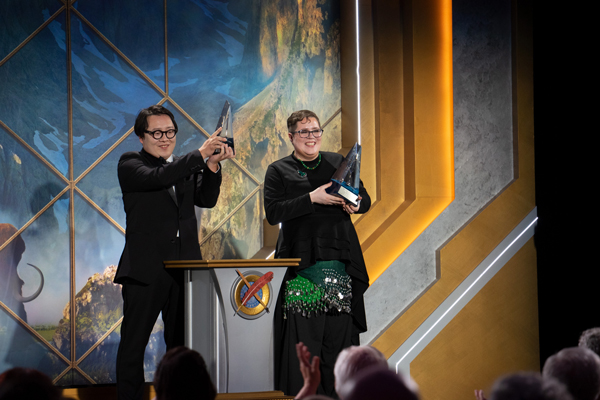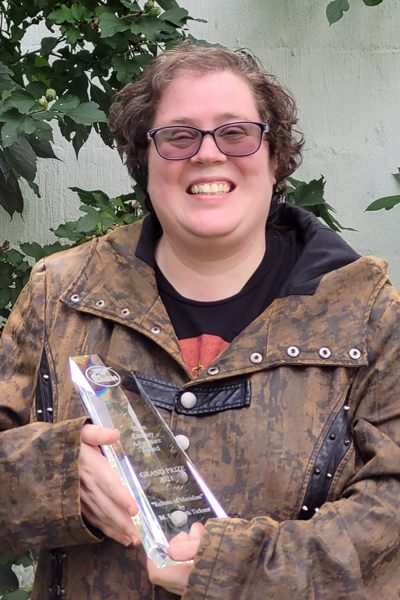Why I Subscribe to the Barbossa Philosophy
I’ve jokingly dubbed my personal writing motto the Barbossa Philosophy because, and I quote, “The code is more guidelines than actual rules.” There’s no singular way of writing that will work for everyone, and a lot of the so-called rules that people espouse are simply things that have worked for them (or they believe will work for them … someday … if they do everything just right). Is this a bad thing? No. However, it’s important to understand that what worked for other writers won’t necessarily work for you and that the reverse is also true.
I didn’t always think this way. As a teen, I thought all Real-Life Actual Writers were very methodical. I wanted to be exactly like them. Unfortunately, tried and true techniques like outlining large projects didn’t often work for me—if I even got past the outlining phase in the first place.
So instead of writing about my own original settings and characters, I mostly wrote fanfiction. I didn’t have to build the overall setting or the characters—I just had to come up with interesting situations to put those characters in. It was play, and because I was playing I could do whatever I wanted. I wrote in whatever perspective or tense I felt like. The longest piece of fanfiction I penned was about 30,000 words, but most were five to ten times shorter than that, and some were the equivalent of flash fiction or drabbles.
When I started taking community college classes, I decided to shift to Real-Life Actual Writing with my own characters and my own settings. I studied all manner of writing books to try and find that magical key that would teach me how to write novels. I even tried NaNoWriMo!
My first attempt at NaNoWriMo was a disaster… as was the second… and the third. When I tried to plan a novel, I got bored. When I tried to pants one, I floundered.
My First Original Short Story
It was around this time that I wrote my first original short story for a Creative Writing class. The teacher loved it and encouraged me to send it out! I submitted it to Intergalactic Medicine Show, a relatively new online magazine at the time. (I entertained dreams that it might be read by Orson Scott Card. He was my favorite sci-fi author as a teen.)
I got a rejection. Shocker of the century, right? Even if the story had been good—and it wasn’t—I didn’t know anything about proper submission formatting.
I buried that story in the depths of my hard drive and essentially gave up writing for the next ten years. I didn’t give up storytelling, though. For the next decade, I focused my creative energies into running and playing tabletop RPGs. I didn’t improve my prose a lot during that timeframe, but I did learn a fair bit about world building, plot, storytelling beats, creating a living outline for a story, and how to avoid panicking if I had to change that outline at the last moment. I also learned how to tell when a story needed to be finished or abandoned because not all games turn out as well as we expect.
In 2015, I decided to get back into writing. Since I couldn’t find the focus to finish a novel, I decided I should work on short fiction until I felt comfortable enough to move on to larger projects. Proving to myself that I could finish something, even something small, would help to build up my confidence as an author.
Discovering Writers of the Future
That was when I heard about Writers of the Future. The idea of having a set submission deadline, of sending a story somewhere every three months, appealed to me. (The fact that Orson Scott Card was one of the Contest judges also appealed to me—not gonna lie.) I decided to race myself by submitting stories to both the Contest and to other notable short story venues. It was a race against myself, a mad dash to see whether I would win Writers of the Future before I pro’ed out of the Contest. Either option struck me as a win.
The problem was that I ascribed entirely too much to the writing advice I was given by others, and more than once, I misinterpreted the advice I was given. This isn’t to say that writing advice is bad! It is, however, important to consider that advice in the context of your own writing. “Write every day” is excellent advice if you have a solid block of time you can devote to writing every day, but it doesn’t work as well for people who are employed at jobs with a constantly-fluctuating work schedule. “Show, don’t tell” is useful except when it isn’t, because sometimes you need to tell in order to get a story past the boring bits—and it only really helps if you have a strong knowledge of what showing and telling are in the first place. (Most new writers don’t.)
It took two years for me to get my first sale. I got my first Finalist around the same time—non-winning, of course. And then… nothing else, for more than a year. I grew despondent—I couldn’t figure out what I was doing wrong.
… And then I got pregnant. With twins.
Birth of Motivation
I couldn’t bring myself to focus on writing for the entirety of my pregnancy, so I skipped out on writing entirely for most of 2018. Once the twins were born, however, they became one of my biggest motivators. I wanted to be able to provide for them financially, and I wanted to do it with work I enjoyed. Returning to the low-wage retail jobs that had tried to suck my soul away over the course of the previous decade didn’t exactly appeal to me. I was better at focusing on writing than I used to be, so the prospect of shifting to novels was tempting. However, being a stay-at-home mom meant I was frequently overtired and overstressed. I decided I’d wait to attempt a serious push toward novels until the kids were in school. In the meantime, I started entering the Contest every quarter like clockwork and sending stories to every suitable market I could find for them.
I got my second story sale while the twins were in the NICU. I wrote my second Finalist story about nine months later. It didn’t win, but it did earn me a scholarship to the Superstars Writing Seminars in February of 2020. The friendships I forged at Superstars that year were life-changing, and the things I learned boosted my writing abilities tremendously. Seeing all the different paths people could take to getting published, learning all the different techniques various writers used, and hearing how some of them actively contradicted each other formed the kernel of what eventually became the Barbossa Philosophy. So I started playing faster and looser with the writing “rules,” experimenting with things like perspective and tense.

I’m fairly certain I wrote as many stories in 2020 as I had in the previous three years combined. I also sold three stories between February and May of 2020—one to a charity anthology, two to professional markets—which threw my previous average of one story sale every two years out the window. The race against myself was starting to get tight.
And then the story sales dried up. Months went by with nothing but rejections, many of them forms. It was depressing, but I kept writing and sending things out because the lull would pass eventually.
Right?
Knowing the Rules and Then Knowingly Not Following Them
Right. In June of 2021, I got a call from an unknown number, and a deep, masculine-sounding voice said, “This is Joni Labaqui.” (I’d exchanged enough emails and phone calls with Joni over the last six years that we were well into “prank-style introductions for Finalist calls” territory.)
After the initial confusion and laughter subsided, Joni informed me—in her normal voice—that I’d made Finalist for the 2nd quarter of Volume 38. Great! Grand! But this wasn’t my first time as a Finalist—it was my third, which meant I knew all too well that the odds were against me. It was also my first story submission to the Contest that had been written in first person present tense, which lessened its chances in my mind—I’d been told multiple times by multiple people that many of the judges had a hard preference for third person past. So I didn’t allow myself room to hope.
Don’t get me wrong. Hope crept in anyway; it always does. But I tried to ignore it because I knew feeding that hope was a dangerous thing.
Not more than a week later, I discovered that I was among three members of my writing group to make the Finalist list for the Baen Fantasy Adventure Award. (Hell of a writing group, am I right?) I was thrilled to hear that my story was under consideration, but the odds of winning both Contests were incredibly low. Besides, the story I’d submitted to Baen already had 15 rejections from previous markets—and it had two different point of view characters, which was something I’d been told was a bad idea to attempt in short fiction. No hope for me.
… Okay, dangerous levels of hope for me.
My husband and I crunched the numbers for placing in either Contest, let alone in both, and the odds were not in my favor. The chance of winning first place in both contests (because that’s always the dream, isn’t it?) was one in eighty, and that’s not even factoring in whatever crazy odds it took to make Finalist in both contests in the first place. And yet I hoped.
It was a fool’s hope, and I knew it. A pipe dream. The emotional roller coaster was real, and I was braced for it to careen off the tracks at any moment.
Thankfully, Joni had better news for me than I expected. When she called me back, it was to let me know that I hadn’t just won Writers of the Future—I’d taken first place in my quarter and would be published in L. Ron Hubbard Presents Writers of the Future Volume 38 with my story “The Phantom Carnival”! My memories of that moment aren’t particularly clear, but I know there was a lot of happy screaming involved. (Possibly also some swearing. I’m a happy swearer.)


… And then, a few weeks later, I found out I’d also won the Baen Fantasy Adventure Award.

It didn’t feel real. In some ways, it never will. But somehow, I managed to win Writers of the Future and the Baen Fantasy Adventure Award in the same year—in the same month, although Baen didn’t actually announce the results until Dragon Con in September. (And I sold three other stories that summer into the bargain!)
I can’t explain how or why it happened. I never have any idea why some of my stories sell and others don’t. The only thing I can say with absolute certainty is that both “The Phantom Carnival” and “Echoes of Meridian” were risky or experimental in some fashion. If I’d continued to follow all the advice laid out for me when I was a new writer, I would never have written either of them.
Remember the Barbossa Philosophy
So keep all of the writing advice you’re given in the back of your mind, folks, but also remember the Barbossa Philosophy. “The code is more guidelines than actual rules.” If something feels right for a story, try it. Worst comes to worst; you can always edit it later. But whether it works or not, whether it sells or not, you’ll be able to take pride in the fact you made the attempt—that you were true to both the story and yourself.

M. Elizabeth Ticknor is a neurodiverse, gender fluid writer and artist; she also donned the cap of editor long enough to put together the 4th and Starlight anthology. She shares a comfortable Hobbit hole in Southeast Michigan with her Wookiee husband and their twin baby dragons. An avid reader of science fiction and fantasy, Elizabeth also enjoys well-written horror. The authors who have inspired her include (but are certainly not limited to) Douglas Adams, Ray Bradbury, Orson Scott Card, Neil Gaiman, C.S. Lewis, Jason Pargin, and Chuck Wendig. Her other interests include drawing, painting, and tabletop role playing.
Website: http://www.ticknortales.com Twitter: @lizticknor




Great article, thanks Elizabeth – so much writing advice seems to be around one particular way, so it’s refreshing to have someone espousing do what works for you. Cheers.